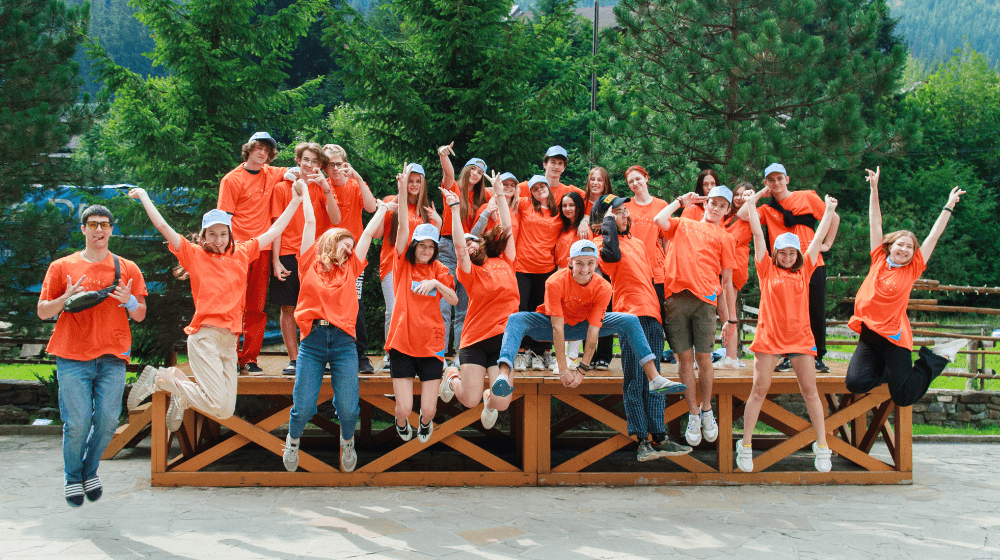The country leisure club is surrounded by spruce and tall Carpathian mountains and looks like an ordinary summer camp for children from the outside. Young couples in love hide in the cozy garden houses in the evening. There are always some football or volleyball players at the sports grounds. You can hear regular encouraging exclaims at the general meeting, “Come on, Vitalia, you can do it! Mariia, you are the best!” Yet, it is only the first impression. The teenagers who are fourteen or older come here from different regions of Ukraine to get trained for twelve days. They are mostly the ones affected by the war. They are quiet and at a loss for the first three days. Some secretly cry against their pillow because they do not remember what it is like to live safely and feel free to communicate with children of the same age.
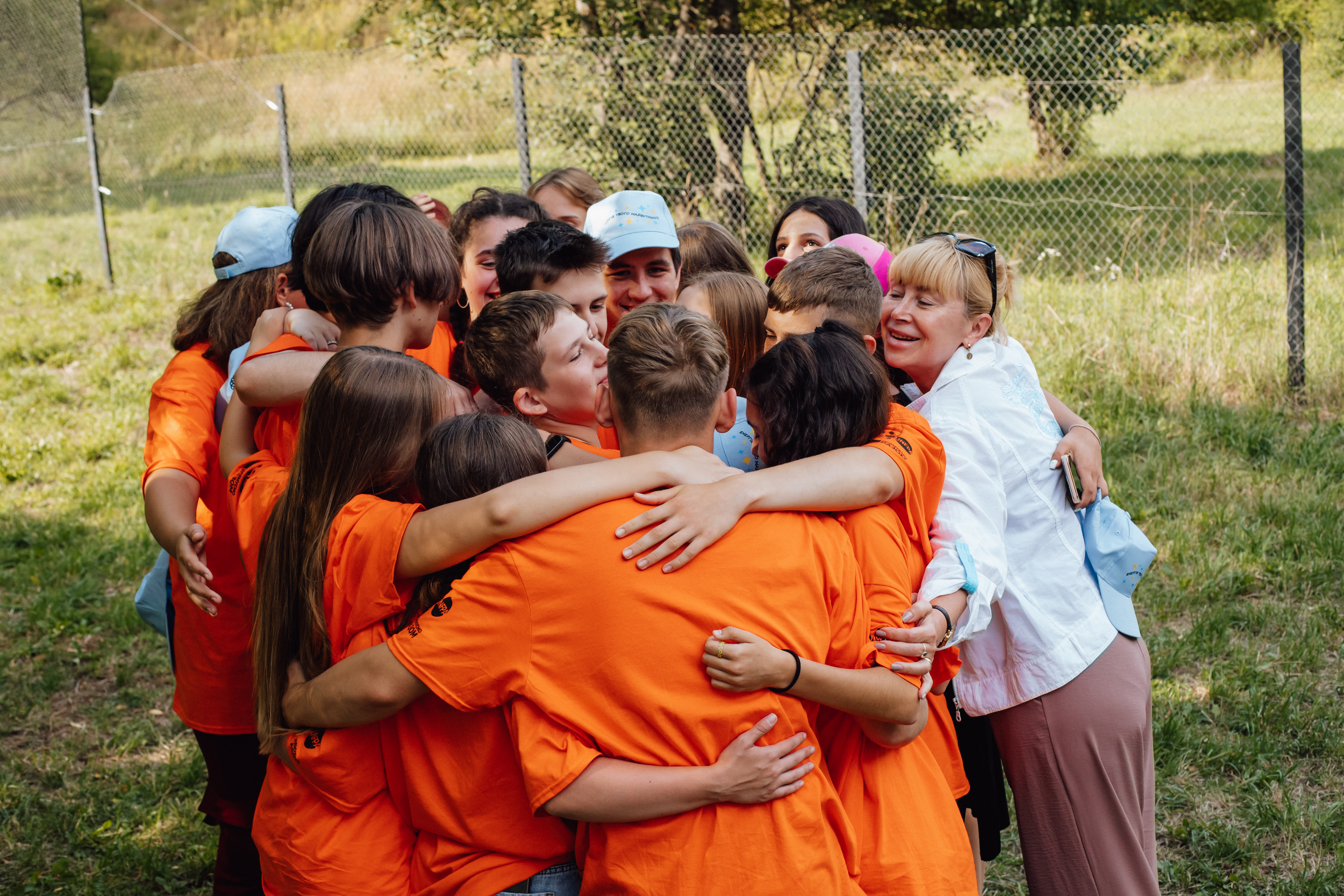
More than a thousand Ukrainian children and teenagers have become victims since the beginning of the full-scale invasion. However, this number includes only those young citizens who have been killed and injured. Many more of them have been affected by the war. Every child who has seen the missiles strike, the houses collapse, the neighbours and relatives die, who has lived in the basement and has been forced to leave home for a safer place is a victim. Ukraine will have to treat the generation damaged by the war for a long time.
Energy of Your Future is not just a teenage camp. It is a comprehensive methodological and pedagogical system, 24/7 work, especially in the context of martial law. The war poses a threat to the children’s and teenagers’ need to see the world as a safe and predictable place, so they naturally feel at a loss and face anxiety, fear, solicitude, or sadness and might be pessimistic about life, people, and their future. It affects their relations with other people, success, or plans for the future.
“The camp will definitely be a happy practice for teenagers if it is real: when adults are wonderful professionals and great personalities, when modern innovational methods of informal education and active forms of leisure are combined. The camp enables the teenagers to obtain the result right here and right now, to present it, and to experience success, which will help them plan their future trajectory with confidence and stick to the principle of achieving the goal. They find single-minded people and exchange information, the energy of thoughts, and emotions in the camp, and the people they meet turn into life-long friends. So the UNFPA is creating opportunities for a thousand Ukrainian teenagers to feel the energy of desire, dream, and plans for the future in a short time again, to be encouraged to develop and increase their vitality,” says Nataliia Leshchuk, the expert of “Energy of your future” programme.
She works wonders in twelve days with a single-minded team of coaches from all over Ukraine. She helps the teenagers whose best years have been burnt by the war regain the right to believe in their future.
The comprehensive programme of the Energy of Your Future is made of skills in five modules: cooperation, creativity, communication, choosing the life journey, and exercises to improve vitality and overcome obstacles during the life journey. The exercises were introduced because the teenagers affected by the war need special attention from psychologists. All the modules focus on each trainee.
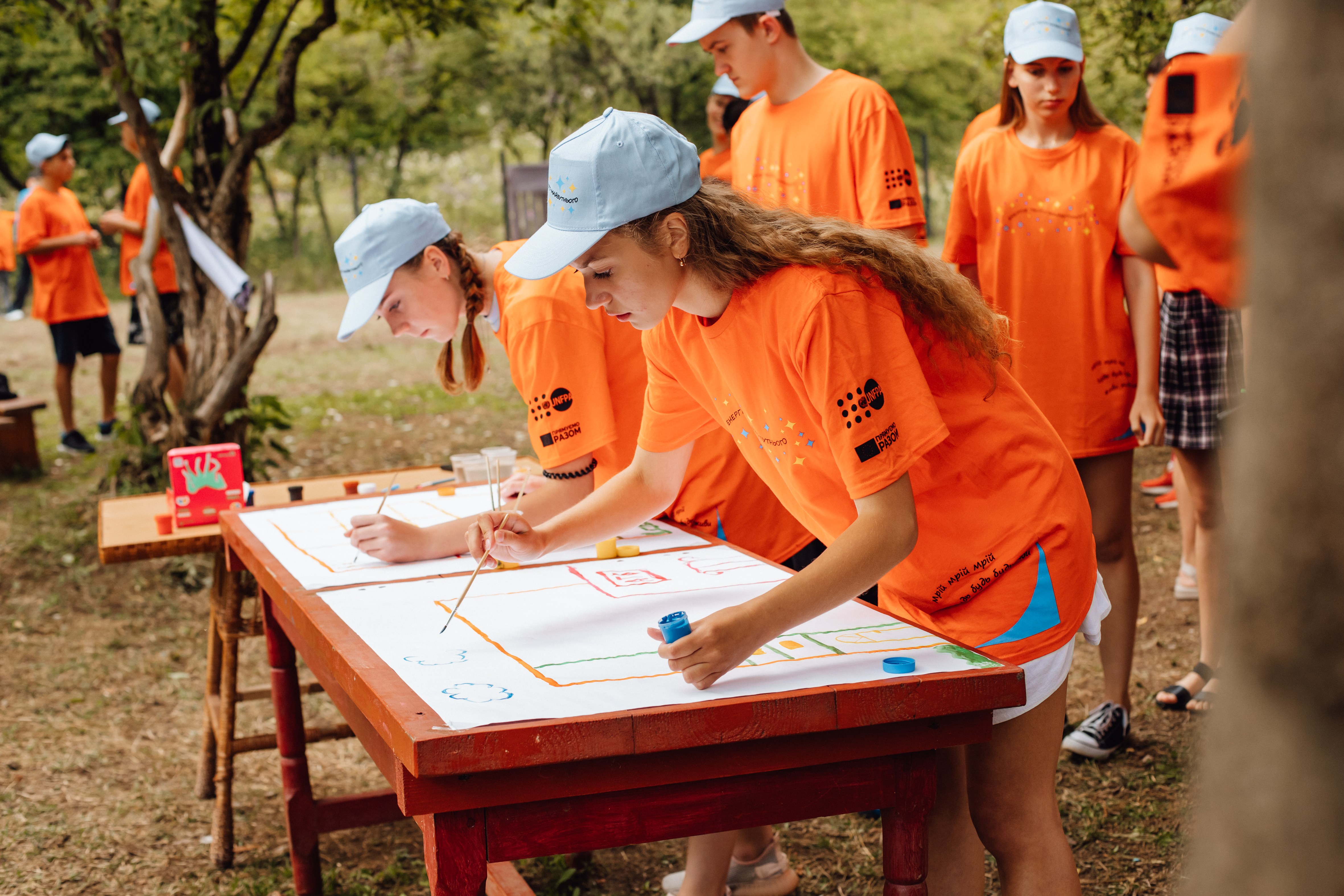
The purpose of the programme is to create an environment of trust and acceptance for open communication that helps the teenagers understand and accept themselves and others, develop the ability to overcome life obstacles, reduce the level of anxiety and fear, for efficient cooperation, constructive interaction and development of the ability to generate new creative ideas with the others and critical thinking, to support professional identity formation, optimistic attitude to own prospects and planning of the future, trust in themselves and their ability to make the world a better place.
The story of sixteen-year-old Mariia Bedzai from Mykolaiv proves that even after you have survived the terrifying moments in your life, the camp training helps you find the strength and the purpose and head for this purpose with the understanding that you are the only one to decide what future awaits this generation of teenagers. The girl’s parents are military. Her father died during the operation conducted to liberate Snake Island. The schoolgirl was grieving, but she had to support her mother, who was in despair. Luckily, she got an opportunity to attend the twelve-day training in the camp “Energy of Your Future.” After the first visit, the girl made sure that she had to live to fulfill the promise she had given to her father.
“We discussed my future profession. He advised me to become a military psychologist. Our militaries do need special support. When I came back to the camp as an instructor rather than an ordinary teenager, after I had lived through twelve days with my team of adolescents, I made sure that a psychologist was the job I wished to do in the future. Although the modules on choosing the life journey and profession are the hardest, I believe I can handle it. I will return to Mykolaiv after the camp is over. I do not want to get evacuated, I want to keep living in my city, finish school with good marks and help recover my country,” says the girl.
According to the programme coaches, there are lots of children like Mariia in the camp. Some of them cannot develop a clear plan for the future in twelve days, but the teenagers acquire the skills that help them truly get their life under control in the future. Another bright example is a boy from Kharkiv. Oksana Ustymenko, a coach from Zaporizhzhia, tells about him.
“The children who have experienced the war never show that they have come from the area of active hostilities. It takes longer to work with them, but the results are obvious. One example - is Tymofii, a boy from Kharkiv. It is hard to imagine what he experienced there, with all those permanent missile strikes and shelling and long hours in the basement. He was afraid to straighten his back in the first days; he looked down and kept silent. At the end of the visit, he feels free to speak his mind at the general camp meeting. He has squared his shoulders, and his eyes are sparkling. It is a psychological indicator that shows that he has overcome his fears and that he can communicate with the other children without fear of being misunderstood. These are the benefits of our programme: nobody is putting pressure on or hurrying you up, and everyone works at their pace. It is your journey to be taken your way.”
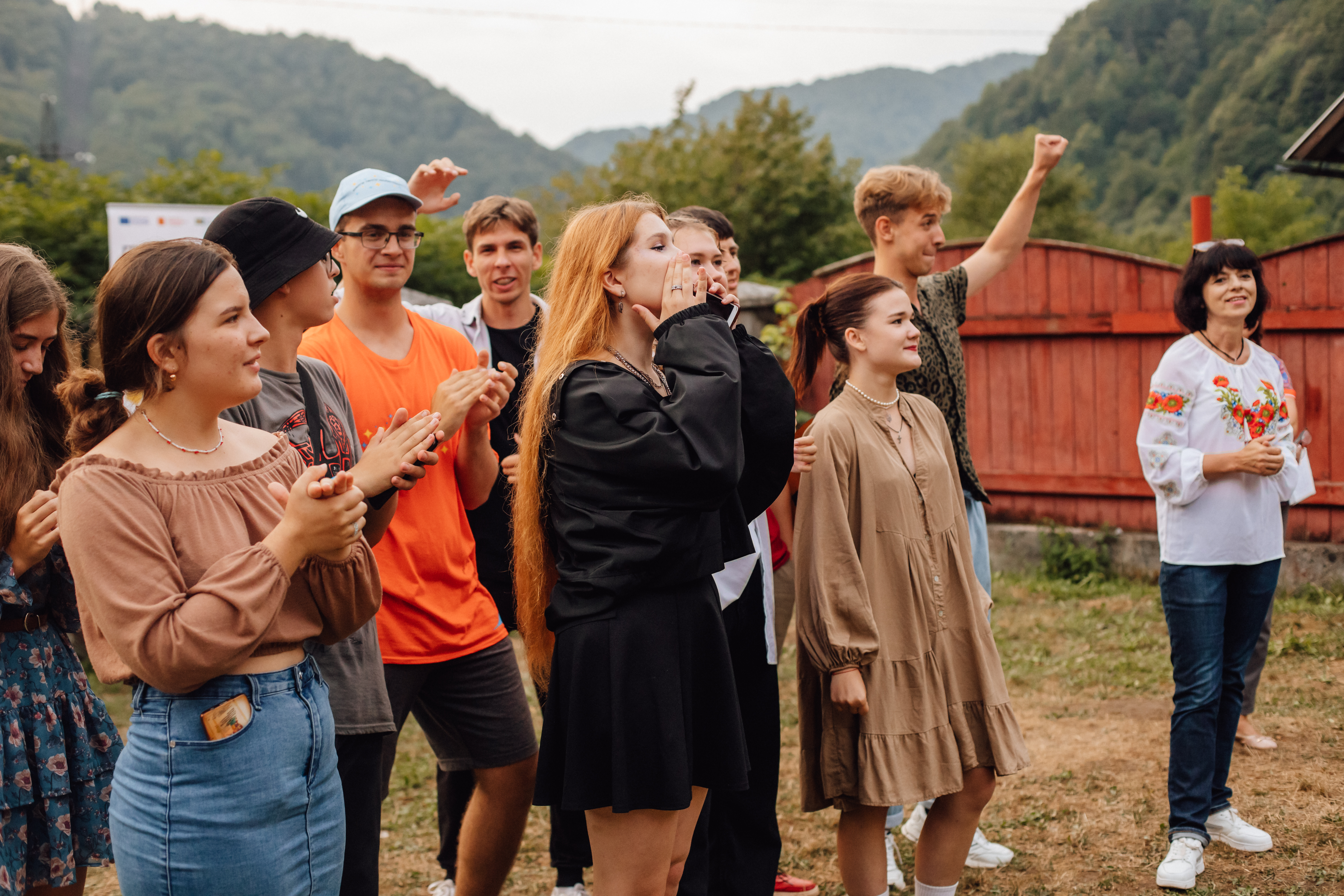
The period at the camp is quite active. There is a schedule for all the time, from the first minutes of the day until bedtime. However, teenagers must have their own time to be spent the way they want. In this camp, such time is evening tea parties organised by the children on their own. After they complete their training and sports exercise, they get together in their rooms, make some tea out of herbs that generously grow in the Carpathians, and start the most important thing: they share the most painful and worrying experiences. The coaches and instructors do not ban such tea parties; on the contrary, they perceive them as the sixth camp module, the unofficial one, which still is very important for the youth.
“We notice that the teenagers change dramatically after such tea parties, after twelve days of their training. The point is that this generation has grown up in the digital era when live communication is already limited. Moreover, the circumstances are special now. You cannot talk to your classmates because the schools, lyceums, gymnasiums, and universities did not work for a long time after 24 February. Then they switched to distance learning. As a result, teenagers who have experienced the terror of war are very reserved. However, they make tiny steps to open up and stop hiding their inner emotions after each module, each story, and each evening tea party. The advice I can give to those who have not got to our programme is to talk, to keep talking about what is hurting you and what you are going through. Talk to the people around you, try to get distracted, and communicate with the other teenagers. Live communication is hard to find in the digital era. Yet, such communication helps you survive, overcome your condition and keep living and planning your future,” says Maryna Matviieva, a coach from Luhansk Region.
The opinion of those of the same age is more trustworthy and important than what the adults say for teenagers aged fourteen to eighteen. Lots of scientists in the field of psychology recognise this fact. It is sometimes scarier for the youth to find themselves in the information vacuum than admit that they are a part of military events. As a result, such children lock themselves up in their little world and feel like they have been rejected, and nobody needs them. One of the peer-to-peer trainees, eighteen-year-old Artur Mamaiev from Kherson, is talking about this condition. When his region was seized, the boy and his family had to hide in the village with no electricity and communication for several months. His grandfather gave new tasks to the grandchildren so that he and his cousin would not lose connection with reality: to chop wood, dig a waste pit, to work in the garden. After Artur's family had decided to try to get to the areas controlled by the Ukrainian Government, it played a low-down trick on the boy.
“Military at the checkpoint saw the photo of me and my cousin working in the grandfather's garden in my phone, and they decided that we had been digging trenches. I was lucky to be saved from the filtration camp there. My parents managed to prove that we had just worked there physically. However, I only managed to overcome the terror I had experienced in the occupation and on my way from there only in the camp. Before I came here, it seemed I had lost everything: my friends who stayed in Kherson, the girl I loved who had left abroad, my group mates from university who became soldiers... But now I understand that life is not over, and the future of Ukraine depends on the people like me. I have found new friends from different regions here. I have learned to communicate with people my age again,” Artur shares his feelings.
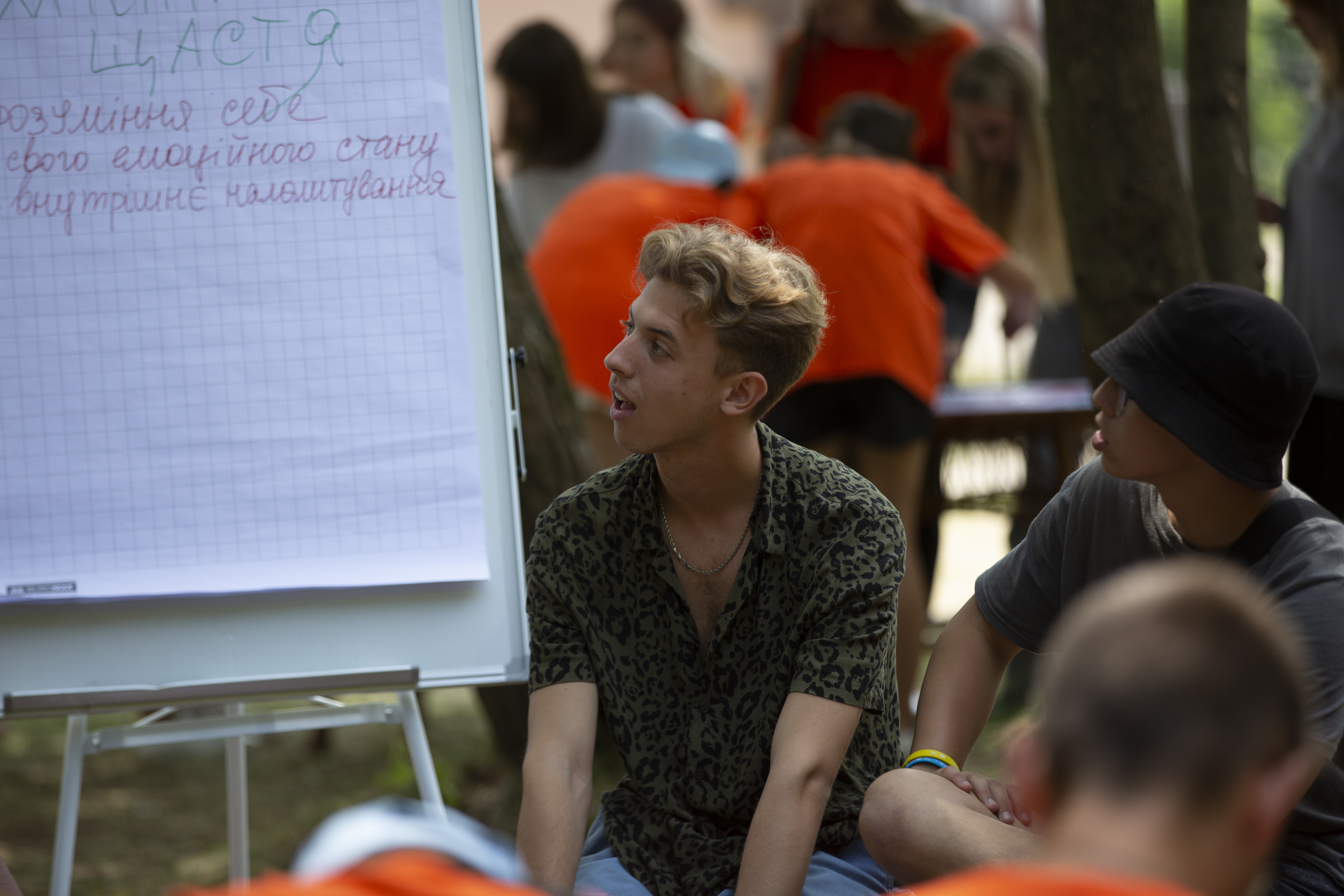
There are more than 700 stories here, and there will be many more if you add positive feedback from the parents or guardians who notice how their adult child changes in twelve days. According to the coaches and peer-to-peer trainees, the breaking point is after the teams go mini-camping, which is always challenging in the Carpathians. You have to cross the rivers and carry backpacks with food and tools. You must also remember that everyone must get to the summit. Different things happen while camping. Someone gets a foot blister, someone runs out of water or food. Of course, nobody leaves teenagers in conditions where they must look for water or food, but this experience is practical. This camping trip is the first one for many teenagers, and it is incredibly emotional.
“The children come to us from different regions. I believe that camping is the climax of the programme. They regain confidence and feel support there. Many of them had to stay at home or in their basement for a long time, and they could not communicate. When they feel their friend’s support at the high summit, they realise they are not alone in this country and this world. When they cross the river, share dry socks or a sip of water or express their compassion, they understand that life is not only a material thing: you must learn how to share what you have in your heart,” says Daria Kabanova, a coach from Donetsk Region.
The most fantastic thing in this story is that almost all the camp coaches were supposed to get together for another training session for the coaches on 24 February in Sviatohirsk in Donetsk Region. After they had arrived at the venue from Kherson, Zaporizhzhia, and other regions, those women had to get back home through the checkpoints and shelling and get together in Zakarpattia Region again because several thousand Ukrainian teenagers needed assistance within this programme. During three months, we managed to organise seven twelve-day visits for 727 boys and girls from different regions of Ukraine affected by the full-scale war.
The comprehensive psychosocial programme for teenagers “Energy of Your Future” is implemented within the United Nations Recovery and Peacebuilding Programme with support by the European Union and financial support by Denmark.

